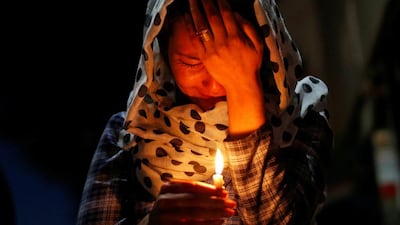KABUL // Kabul was reeling on Thursday from its deadliest attack since 2001, with anguished residents burying their dead as authorities cleared away mangled wreckage and public anger mounted over the government’s failure to protect citizens in the heart of the capital.
No group has so far claimed Wednesday’s attack, launched from a sewage tanker packed with explosives, which tore a massive crater in the ground and killed at least 90 people, mainly civilians, while wounding hundreds. Afghanistan’s intelligence agency has blamed the Taliban-allied Haqqani Network for the attack.
Angry citizens demanded answers from the government over the perceived intelligence failure leading to the assault, which underscores spiralling insecurity in Afghanistan.
“For how long will we have to tolerate this bloodshed in our country?” one sobbing resident asked. “I have lost my brother in the blast and the government is constantly failing to provide us with security.”
As road sweepers began clearing up the debris and charred carcasses of burnt-out cars, people continued searching for loved ones. Mohammad Akbar, from Kabul’s Paghman district, was looking for his cousin, 25-year-old Nawid, who was last seen entering the ministry of transport and aviation, where he worked as a driver, but has been neither seen nor heard since the blast.
“There are more than 20 of us here from the family, in several cars, looking for Nawid,” said Mr Akbar. “We’ve searched all the hospitals, even the private one. We haven’t found the government car he was driving, a Corolla, or even a part of the car, even though we’ve searched the area of the attack and the car pound where they’ve put damaged cars. We called him immediately after the explosion but his phone was off. We contacted the police, they’ve got photos and details but they failed to find anything either. Nawid is 25, he’s married with two little children, a daughter and a son. He’s the youngest of three brothers. We don’t know what to say now to his family. What do we say to his wife and mother? They know about the explosion but we told them Nawid is detained and they are already going crazy.”
Shams Azimi was luckier. He discovered his son, Abdul Aziz, in a hospital bed, bloodied and hurt, with a bandaged head, but alive.
“When I heard the attack was in the Wazir Akbar Khan area, I rang my son but got no answer so I came straight here,” said Mr Azimi. “An official read out a list of wounded patients — 57 names, but not my son. It made me crazy. I did not understand myself any more. I forced my way into the hospital an checked all the dead bodies. Then I tried to get into the operating room but people stopped me. Then I went looking from bed to bed and after a few rooms I found him, asleep. He was in plaster, his head was covered in cotton but I was so happy I couldn’t speak.”
His son was married only seven months ago and worked for a communications company.
Mr Azimi spent the night on the street and said local people had brought out iftar meals and drinks for all those gathered at the hospitals waiting for news. But he was worried because he has not been allowed back in to visit his son.
The street outside the Emergency Hospital remained thronged with men, women and children, many of them crying and exhausted after a night on the street. The hospital was not letting relatives in to avoid overcrowding.
One young man said his brother, a doctor at the Royal private hospital, had head injuries and couldn’t speak or recognise members of his family.
The brazen attack during Ramadan highlighted the ability of militants to strike even in the capital’s most secure district, home to the presidential palace and foreign embassies that are enveloped in a maze of concrete blast walls.
Global outrage swelled over the massive blast, the deadliest single attack in Kabul since the Taliban were toppled from power in a 2001 US-led invasion. The Taliban — currently in the midst of their annual “spring offensive” -- denied they were involved, although they rarely admit committing attacks that kill large numbers of civilians.
ISIL has had no such compunctions, claiming responsibility for several deadly bombings in the Afghan capital, but so far has not claimed responsibility for Wednesday’s blast.
Amnesty International said the bombing shows that the conflict in Afghanistan is “dangerously widening in a way that should alarm the international community”.
foreign.desk@thenational.ae
* With additional reporting from Agence France-Presse

